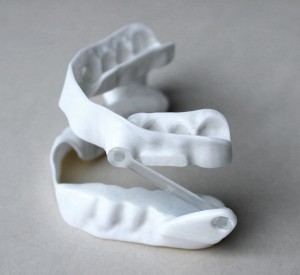
Sleep apnea is a disorder in which affected people have periods of sleep during which they stop breathing. These periods can last for 10 seconds or longer, and is caused by the throat muscles becoming over-relaxed, thereby blocking airflow. Although you’ve likely heard of the disorder, you may be shocked to know that approximately 18-25 million people live with obstructive sleep apnea or suffer from some of the symptoms. But, did you know a dentist could be the first person to help make the diagnosis?
Sleep apnea is dangerous because it deprives the brain of getting the oxygen it needs to function properly. If persistent and severe, sleep apnea can lead to high blood pressure, diabetes, chronic acid reflux, heart disease, and stroke. Although people with sleep apnea tend to be older and have a family history of the disorder, other conditions such as obesity, smoking, and excessive consumption of alcohol or sedatives can cause it to develop as well.
The reason sleep apnea is most often diagnosed by a dentist is because of how it can affect your oral health. Although the most common symptoms are snoring, waking up feeling tired, waking up frequently throughout the night, and difficulty concentrating, these can also be indicators of a wide range of other issues and can be difficult to pin to sleep apnea.
Common dental symptoms of the disorder can help narrow down the problem. In particular, people with sleep apnea tend to have jaw pain, dry mouth, and weak or flattened teeth due to the way the disorder affects the mouth while sleeping. Since the body wants to keep air flowing, the jaw tends to clamp down to prevent throat tissue from blocking the airway from closing. This pressure can wear down the teeth over time, making them more susceptible to breaking and cracking and causing pain when chewing. This can also lead to tooth grinding, which will present itself as a flattened bite surface on the teeth along with increased overall sensitivity.
Snoring keeps the mouth open during sleep, which creates a drier environment. This prevents saliva from cleaning the mouth during the night, which makes teeth more susceptible to depredation from oral bacteria and any debris that wasn’t cleared away by brushing and flossing. Thus, poor oral health, combined with an evaluation of other symptoms, can help a dentist to pinpoint whether or not a patient is suffering from sleep apnea.
There are a number of ways to treat sleep apnea, most of which involve wearing some sort of device while sleeping. Mouth devices, such as custom retainers and mandibular advancement devices (pictured above), all help adjust the hinge on your lower jaw and stabilize the tongue to help keep the airway open while sleeping.
Another common device is CPAP or continuous positive airway pressure. It consists of a mask that fits over your nose or over your nose and mouth, as well as a machine the pumps air through the mask and into your airways to keep them open during the night. Although these devices tended to be bulky and uncomfortable in the past, they’re now lighter and more unobtrusive than ever, making them a popular choice for people suffering from sleep apneas.
Finally, there are a number of different positioning pillows available that can help prop up the head and neck such that the airway doesn’t collapse during the night. Some people are able to alleviate their symptoms using the pillow alone, though they’re commonly used in conjunction with CPAP or a retainer.
Sleep apnea is often difficult to diagnose, but don’t panic if you dentist brings it up—and don’t hesitate to bring it up with your dentist!. The wide range of treatments available can help greatly improve your quality of life and your overall health, and prevent a number of dangerous disorders from occurring. Do you have a question about sleep apnea or want to share your experience? Let us know in the comments!







Leave a Reply